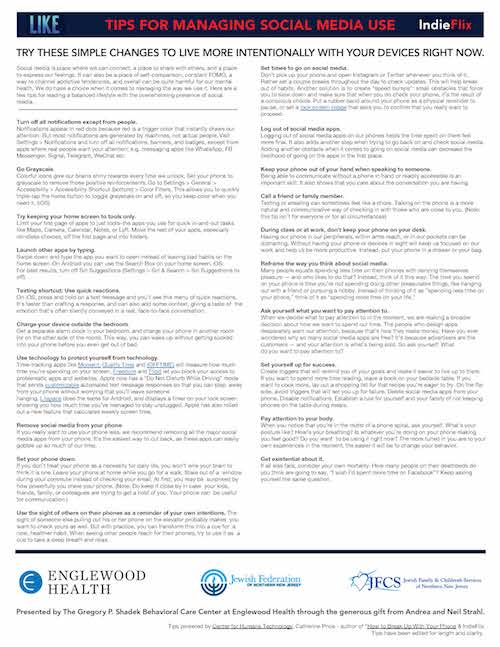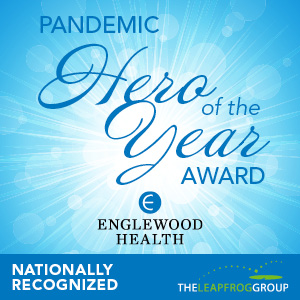Raise your hand if your kid scored a new screen over the holidays! Even if you didn’t yield to requests for the new iPhone or an updated tablet, these pandemic times have made it even harder to keep kids from staring at those blue lights long after school has wrapped for the day. Especially during quarantine and lock-down, technology has become their lifeline to stay connected to friends and the rest of their world. So, what are responsible parents to do when we all know that too much time staring at screens and scrolling through social media can really affect the way our kids behave and see the world?
Last November, through a generous gift from Andrea and Neil Strahl, in partnership with the Jewish Federation of Northern New Jersey, Englewood Health, in Englewood, New Jersey, presented a virtual screening of the movie “LIKE,” a documentary that discusses the effect of social media on teenagers and how social media has become ingrained in the daily routines of children and adults. “LIKE” looks at how we use social media, how it’s marketed to us, and how it affects us socially, emotionally and behaviorally,” said Danielle Lambert, LCSW, behavioral health manager at Englewood Health. “The intent is for us to think about how we use social media, and what changes we can make in our lives to prevent isolation, anxiety, depression, and the symptoms and conditions that can be exacerbated by excessive use of social media.”
Three hundred people participated in the screening and a panel discussion that followed. Some of the suggestions made to the parents and teens in attendance included the following:
Step away from the phone. Easy as that. When you are speaking with another person, put your phone down. During class or work, don’t keep your phone on your desk. Set times during the day to check your phone, but otherwise, put it down and walk away. Use the sight of others on their phones to remind you of how you look on yours. And, one more time for the folks in the back, don’t charge your phone in your bedroom. That text from your college roommate can wait until morning. Just because she has insomnia doesn’t mean you have to as well!
Schedule your social media. Remove all social media apps from your phone and only check these platforms from your computer, if possible. Then promise yourself you won’t access them through the web on your phone browser. Even better, log out of your social media accounts. Having to remember your password is a great deterrent to logging back on! Set a few times a day to check social media and then keep yourself to a strict time limit. “Speed bumps” like visual reminders or a lock screen that asks if you really want to get on social media also help. But remember, limiting your social media does not equal denying yourself pleasure. Reframe your thinking to realize that actually interacting in the real world is a good thing.
Use technology for protection. Uh, this sounds…counterintuitive. But using an app to help limit screen time and break bad habits is a good idea. Turning off social media notifications is also helpful. You won’t feel compelled to look if you don’t know what’s there. But move all non-tool apps off your home screen. Having to search for them might slow you down enough to realize you have better things to do with your time. Finally, go grayscale. If your phone looks boring, you might decide it probably is boring.
Go old school. You don’t realize how great it is to talk to a friend until you have picked up the phone, called said friend and had the pleasure of speaking with them. Don’t text or message them. Pick up the phone and call.
Be your best self. Do you really want to be that person who has their head in their phone all.the.time? Is that the memory you want people to recall at the end of your life? Pay attention to how your body feels after a day of social media gazing. More importantly, pay attention to how your brain feels. Probably the mental equivalent of how your stomach feels after eating an entire bag of Doritos. Sooo good while it’s happening, but doesn’t feel great in the aftermath. Just remember, you only get this particular day once in your life.

While altering social media habits can have a significant impact, improving mental health goes far beyond the web and affects not only the individual, but also the entire family. In response to the growing number of children and teenagers experiencing anxiety and depression in the U.S., intensified by the emotional toll COVID-19 has taken on the youth population, Englewood Health is expanding its behavioral health and emotional wellness programming for youth at risk for poor health outcomes. To do this, Englewood Health has partnered with Bergen Family Center’s (BFC) Division of Adolescent Services—which includes the ZONE, a school-based youth services program—to support the emotional and mental health of the youth they serve, as well as their family unit as a whole.
Funded by a three-year grant, made to Englewood Health from the Palestroni Foundation, the program—which began in January 2020—aims to provide psycho-education for youth and caregivers through workshops, webinar series, educational materials, and support groups, offering coping skills for navigating various challenges.
“We recognize the unmet need for quality behavioral health services to address the challenges faced by our youth,” said Darline Jerez, LCSW, community health program liaison at Englewood Health. “Prior to COVID-19, the rising rates of anxiety and depression alone showed us that youth interventions are a major need in our communities. Since COVID-19, not only have the rates increased but the severity of symptoms has worsened. The pandemic uncovered concerns that were once minimized, even neglected. The time has come for youth mental health challenges to be viewed and addressed with the same intensity and significance as any other need.”
For more information about the "LIKE" documentary, visit thelikemovie.com, and check out Facebook, Twitter and Instagram (during one of your scheduled social media times, of course). For behavioral health resources and to keep an eye out for future screenings of LIKE, visit englewoodhealth.org.
Englewood Health 350 Engle Street, Englewood 201.894.3000

![Englewood Health Talks Teens, Screens and Mental Health [dedicated]](/images/jcogs_img/cache/LIKE_Englewood_Health_Film_-_28de80_-_a0186e6c19ae98bf46c2e604acebf2feb999faac.png)






